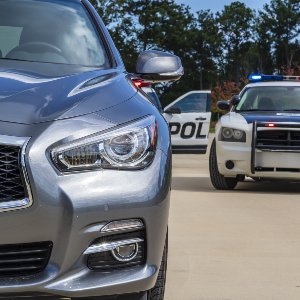What Is the 10-Day Rule for DUI in California?

If you’ve been arrested for driving under the influence in California, it may take a toll on your mental health, finances, social life, relationships, and job. You may also have to endure court appearances, fines, and a suspension or revocation of your license. That’s why it’s vital to understand California law and the rules and regulations surrounding DUI arrests.
One of the most important components of a DUI arrest that you must immediately recognize and act upon is what happens with your license. If you’ve been arrested for driving under the influence in the state of California, you’re subject to a restriction known as the 10-day rule.
What Is California’s 10-Day Rule?
After your arrest, the responding officer confiscates your license and provides you with a pink slip of paper—known as a Notice of Suspension—that allows you to drive unrestricted for 30 days. At this point, the DMV begins the process of suspending or revoking your license. You have the right to contest the suspension by contacting the DMV within 10 calendar days to schedule an Administrative Per Se Hearing. Failing to do so results in an automatic license suspension after 30 days.
The arresting officer has grounds to confiscate your license if they suspect you may be driving under the influence, which would involve you failing or refusing a breath or blood test. It’s important to note that officers may not seize your license if they believe you’re solely under the influence of a drug other than alcohol. If this is the case, you may not need to attend a DMV hearing.
Finally, California police officers have no jurisdiction to confiscate the license of an out-of-state driver. If you live out of state, you may still be arrested, and you are still required to request a DMV hearing. If you fail to respond in accordance with the 10-day rule, you may lose the right to drive in the state of California and potentially in your home state as well, depending on whether that state is a member of the Driver’s License Compact Agreement.
How Do You Request a California DMV Hearing After a DUI Arrest?
After your arrest, you may be able to contest your suspension by contacting your local Driver Safety Office to request an APS hearing and a stay of suspension. This information will be listed on the Notice of Suspension slip given to you by the arresting officer, so keep track of the slip. Note that this is separate from a Court hearing. Once your request has been filed, the office will send you a longer-lasting temporary license and set a date for your hearing. It’s essential at this point that you contact an experienced California DUI lawyer to help defend your rights and protect your license.
During the hearing, the DMV may try to establish the following: that you were legally stopped, that your arrest was legal, and that your blood alcohol level was above the legal limit at the time you were driving. Your attorney may contest errors and insufficiencies in an attempt to disrupt the DMV’s case and get your license back to you. If it’s determined that your license should be suspended, the duration is nonnegotiable and varies based on your circumstances.
If you ignore the 10-day rule completely, your license will be automatically suspended 30 days after your arrest, and you’ll have to endure a much lengthier process to regain it. Expert legal counsel will best be able to explain your options based on the circumstances of your arrest.
Contact an Experienced DUI Defense Lawyer at the Aron Law Firm
The 10-day rule is just one of the many reasons why it’s so important to act quickly and contact an attorney after you’ve been arrested for driving under the influence. At the Aron Law Firm, we know how frustrating and hopeless a DUI arrest can feel, so our goal is to make this process as easy as possible. We are ready to protect you and guard your rights.
The Aron Law Firm is led by Attorney William M. Aron, who previously served as a California Deputy District Attorney and has substantial experience with a broad variety of criminal cases. Mr. Aron and his legal team strive to help their clients get the best results possible. Call (805) 500-7324 or complete our contact form today for a consultation.

EXPERTLY REVIEWED BY
William M. Aron
June 23, 2022
Former Deputy District Attorney William Aron received his Juris Doctorate from the Duke School of Law and has amassed 20 years of experience practicing law. Attorney Aron dedicates his practice to defending the accused, and is devoted to keeping his clients out of prison.

